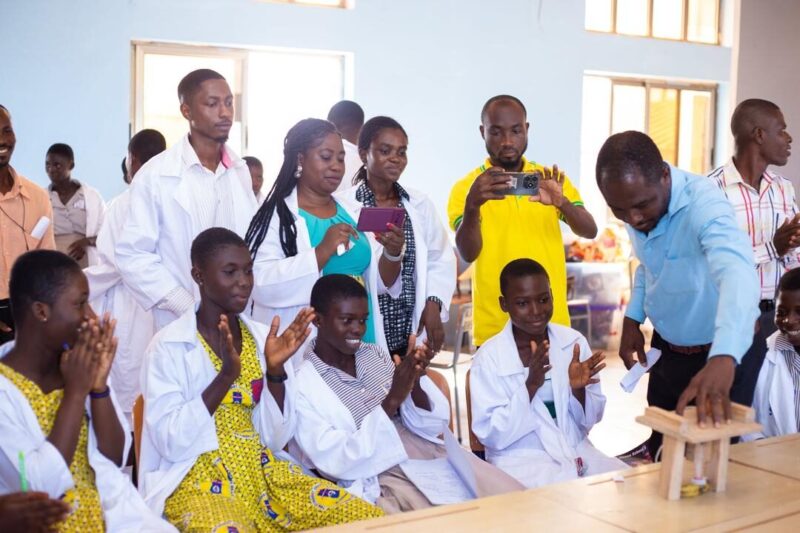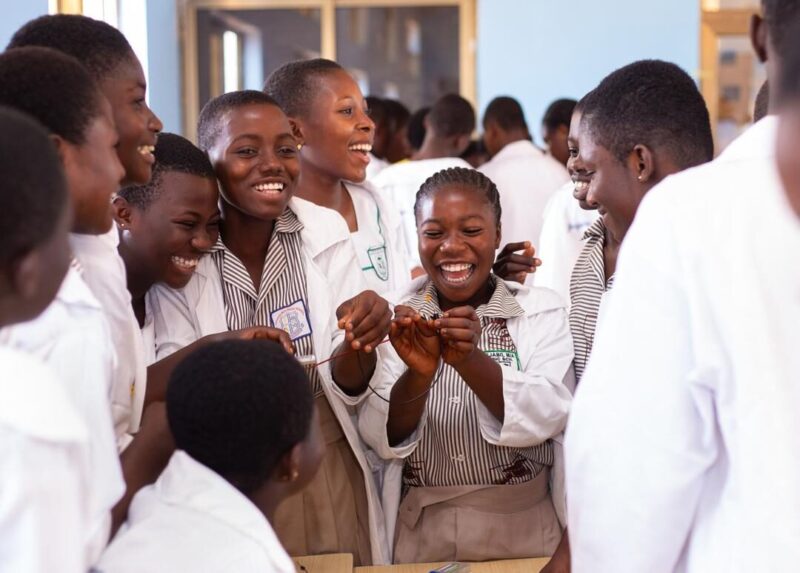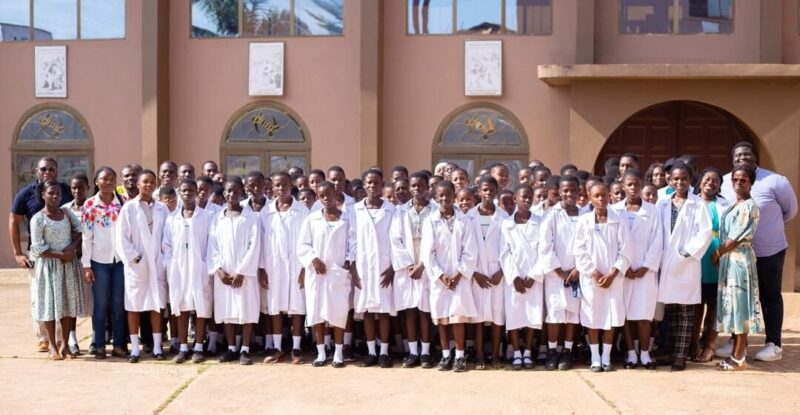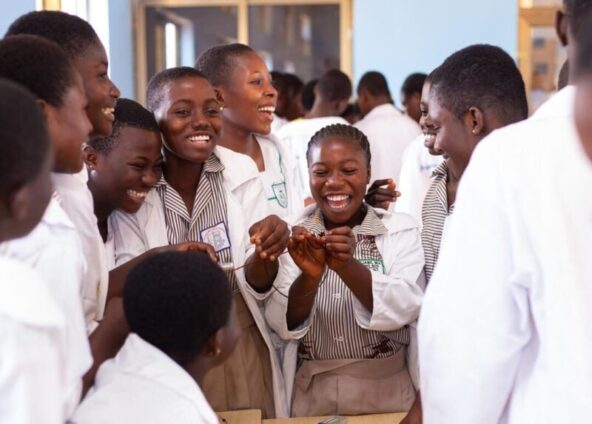Seated under the shade of the Apowa Catholic Parish, Stephanie Nyarko, a 15-year-old student from the Ahanta West Municipality, was visibly intrigued.
This was not just another day at school, it was the second annual STEM clinic organised by Yinson West Africa in partnership with the Youth Bridge Foundation.
As science equipment was placed before her, the shock on Stephanie’s face was mirrored by her peers.
Stephanie, like many other girls, had spent her academic life studying science in theory. She had seen pictures in textbooks, but the sight of actual science apparatus left her in awe.
“They said science is hard, so I vowed never to be a science student,” she confessed. “But after my experience today, I am confident of becoming one of the best science students in Ghana.”
The emotions resonating in the room weren’t just of amazement but of new possibilities. The clinic's hands-on approach to learning STEM subjects, science, technology, engineering, and mathematics, was designed to demystify these fields, especially for young girls who had long been sidelined in science education.
Dorothy Abokoma Mensah, the Western Regional Zonal Manager for Youth Bridge Foundation, emphasized that the goal of this clinic was to empower girls to break the perceived barriers between them and STEM.
"For too long, there’s been a disparity between boys and girls when it comes to science education," Dorothy explained. "At Youth Bridge Foundation, in collaboration with Yinson, we’re determined to bridge that gap through this annual STEM clinic.
By bringing practical applications into the mix, these girls can now see the science that exists in their everyday lives and develop a love for it."

The day's activities were interactive and engaging, ranging from simple filtration experiments to more advanced scientific demonstrations.
One standout experiment involved the filtration of muddy water, where the students learned how to separate insoluble materials from a solution.
“When they go back to their homes, they’ll be able to replicate these experiments, using items like cheese cloths, to filter water,” Dorothy said.
“This hands-on approach helps to show them that science isn’t just something abstract or confined to textbooks.”
This level of practical exposure was a first for many students. Selina, one of Stephanie's classmates, shared her disbelief at finally getting to touch the equipment she had only ever seen in books.
"This is the first time I’ve seen most of these things. It feels different touching them,” she said, eyes wide with excitement. For Selina and others, the experience was an eye-opener. A shift from fear of science to curiosity and enthusiasm.
The headteacher of Biaho Catholic Basic School, Mrs. Linda Fynn reaffirmed the sentiments of gratitude for the program.
“In our classrooms, we mostly teach theory, especially when it comes to science. Many of the girls don’t get the chance to work with equipment,” she said.
“This clinic is a game changer. I believe that when these girls return to their classrooms, they’ll not only excel in exams but also help teach their peers.”

For Yinson, this program was more than just an educational initiative. It was a step towards changing societal norms. Edward Mensah, Yinson’s Corporate Social Responsibility Coordinator, explained that the company’s commitment to education, particularly for girls, is deeply rooted in the belief that gender equality in STEM is vital for societal progress.
“We are dedicated to supporting initiatives that promote quality education and effective learning for girls,” Edward said. "At Yinson, we see this as our contribution to the UN’s Sustainable Development Goals, particularly Goal 5, which focuses on gender equality.”
The clinic also sparked important discussions about long-standing challenges faced by girls in STEM.
Madam Kangah from the Girls Education Unit at the Ahanta West Municipal Assembly, shared her thoughts on the historical inequalities girls have faced.
"Girls have long been seen as second-class citizens in education. STEM has traditionally been a male-dominated field,” she said.
“Programs like this are essential because they address the root of the problem, showing girls that science is not beyond their reach."
Last year’s STEM clinic had already begun to break down these barriers. Akanga recalled the story of one girl from the previous cohort who, after attending the clinic, boldly declared, “Maa, is this what they say we cannot study? I can do this.”
That single statement captured the essence of the entire initiative, changing mindsets and building confidence.

As the day’s activities wrapped up, it was clear that the impact of the STEM clinic would be long-lasting. For girls like Stephanie and Selina, the clinic had opened a new chapter in their academic journeys. They were no longer intimidated by science but inspired by it.
One student, Meritocratica Arthur of Methodist school beaming with excitement, summed it up best, "This is a privilege that I wish every school in Ghana could experience. Thanks to Yinson and Youth Bridge Foundation, I now see myself scoring one for science."
Yinson’s commitment to empowering girls through STEM is not just about education it's about fostering a generation of young women who will confidently step into the world of science, technology, engineering, and mathematics, knowing they belong to Yinson Ghana's corporate social Responsibility Coordinator Edward Mensah hinted.
Latest Stories
-
Chris Brown jokes about ‘nice’ jail as he starts UK tour
8 minutes -
Juror dismissed in Diddy trial over ‘inconsistencies’
18 minutes -
Don’t allow Executive or Legislature to encroach on judicial independence – Justice Adjei
1 hour -
Bibiani Goldstars crowned champions, squad rewarded by betPawa in bonus payout
1 hour -
Capping Supreme Court judges won’t be helpful – Justice Suurbaareh
1 hour -
Mahama is Ghana’s most prepared President – Gabby Otchere-Darko
2 hours -
Samer Chedid succeeds Mauricio Alarcón as CEO of Nestlé Central and West Africa
2 hours -
Stephen Ntim takes temporary break as NPP Chairman due to health concerns
2 hours -
Abolish ‘Additional Judge’ practice in lower courts – Justice Dennis Adjei urges
3 hours -
District assembly elections are already partisan – Sir Dennis Adjei urges reform
3 hours -
Africa World Airlines reschedules Accra–Ouagadougou route launch to 1st July
3 hours -
Mahama vows to reignite dream of Bukom Boxing Academy
3 hours -
Once I put on my judicial cap, my faith has nothing to do with judgement – Supreme Court nominee
3 hours -
LGBTQ: Judges must uphold the law, not personal faith – Justice Dennis Adjei
4 hours -
“If you cannot marry at 16, why sex at 16?” – Justice Adjei punches holes in Ghana’s laws
4 hours

